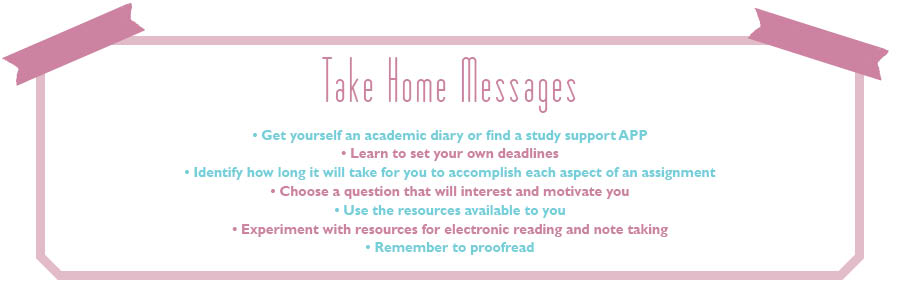Planning

It is important to develop the regular rhythm of balancing study and other aspects of your life, but of particular importance is developing approaches to preparing for exams and completing assessments on time and well. As with everything else there are different strategies students use to do this, but here are some ideas, techniques and practical things students shared with us.
Get a diary
Students we spoke to all commented on the enormous value of having a diary in order to record and organise their social and work lives (be it academic or part-time jobs).
"Having a diary has been key, and it didn’t even cross my mind in first year that that would be helpful… I’m going to work on this essay on this day and that sort of thing.”
The type of diary or planner people used varied, some had a paper diary, others a planner on the wall, increasingly students are looking to APPs as a way to manage time and plan. There are many free ones around for both IOS and Android systems so look around. One free one that was suggested was ‘My Student Life’ (https://www.mystudylife.com/).
Another student mentioned the importance of getting an ‘academic diary’, which is particularly designed to include space for assignments. The Student Union Shop has academic diaries and other planning resources.
Setting your own deadlines
One of the key functions that using a diary or an APP served for students was the ability to not simply record the official deadlines for the assignments, but to also set their own deadlines and their own lists of activities.
"Basically, set your own deadlines, that’s what I do… Give time if things go wrong, so giving yourself enough time to allow for the fact that things do go wrong, a lot of things pop up that you might not have expected.”
A number of benefits follow from setting your deadlines:
- Enables you to be aware of and manage the multiple assessment deadlines and exam dates that can (and will) occur at peak times of year.
- Leaving enough time for proof reading and checking over the assignment. Students mentioned assignments where they knew they had lost valuable marks because they had not left enough time for doing this.
- Allows for things to go wrong like a problem with your laptop or a personal emergency without it effecting the quality of what you submit (while a personal emergency may lead to an extension, computer problems are not grounds for an extension).
My own speed
Providing your own deadlines requires an appreciation of how long it takes you to perform certain key academic tasks (e.g. reading, writing, proofreading, etc.), and the students we spoke to made it clear that to be successful they needed to acknowledge their own speeds.
"Highlight the essential reading, one or two little articles, and you get those articles and you keep an eye on the clock while you are reading, and you start to build up an idea of how long it takes you to get through a certain amount of text, that’s been my experiences. Take the essentials because they give you the building blocks and ways forward and see how long they take you to read a paper."
There are different ways of reading and you may have heard the phrase ‘speed reading’, which implies that the quicker you read the better. That is not necessarily the case, most of our students emphasised the long term value of reading carefully and slowly, particularly when first coming across new ideas and concepts.
"I always try to read things quite slowly and particularly in first year, academic texts and articles, which we haven’t experienced before, took me a long time to read them and to properly understand them.2
However, this does not mean you don’t target your reading efficiently. As you develop your skills you will find ways to focus your reading and note taking on the specifics of the assessment and what you need to do to answer the question.

Breaking up your study time
Studying effectively does not mean studying for endless hours. All our students recognised the value of breaking up study time into manageable chunks and often used various targets and treats to help structure things:
- Work for 2 hours and then have a break to walk to the shop and buy something you like to eat.
- Set a (realistic) word length goal for what you will achieve in a specified time period.
- Go out in the evening for a drink with friends at a local bar or café if you have covered the range of work you
had planned for that day.
One student highlighted a particular method for breaking up study time that she found really helpful. It's called the Pomodoro Method [hyperlink http://pomodorotechnique.com ]:
"I only found out about the Pomodoro method two months ago and it’s absolutely brilliant. You block off your time into two, two and a half hour blocks; you work for 25 minutes, you take five minutes on Facebook, make a cup of tea, whatever; you repeat that three times and then you take a slightly longer break, twenty minutes, half an hour and then you start again. You do three or four 25 minute blocks, you’ve got to be disciplined, but I found that so helpful in terms of focusing your effort without burning your brains out, really useful."
Choosing the assignment question
With the work plan organised and mapped out, the next task when preparing an assignment is to choose a question (while the focus here is assignments, similar points were made on preparing for exams). Students were vocal on the strategies they employed to select which question they decided to focus on:
- Pick something you are interested in as that will keep you motivated. One way of establishing that is thinking about lectures, seminars or workshops that really interested you and identifying the questions that relate to those sessions. This also gives you a starting point for developing your reading for the assignment as you can work from the reading associated with them.
- It can also be useful to think about are there particular topics/issues the module leader seems particularly interested in? Working on key topics within the module will ensure there is plenty of pointers for reading and key areas to cover; it also means the module leader will be particularly knowledgeable on the topics that seem of particular interest to them.
Establish the resources that are available
One of the first stages of planning for an assignment or exam is identifying and then finding the resources you need to complete the work. Over time students developed techniques for effectively identifying what they needed:
- Who/what do module leaders use in the lectures around the topic you are revising for or developing your assignment essay question around.
- This may seem obvious - but it came up a lot with the students - assignment guides provide lots of information about what is required. Keep it handy, read it over and return to it at various points to ensure you are following the brief you have been asked to do.
- There are now many electronic sources of material and students are becoming more skilled in both acquiring resources electronically and also working electronically on note taking and assignment building. If you make your notes electronically, then that also can become the basis for your assignment plan, which can then provide the scaffolding for beginning to write it up. It is not to say working on paper does not work or is less efficient, but more that you may want to explore what you can do electronically and how you can incorporate that into your working practices.
- PDF software of different types and for different systems increasingly allow you to annotate your reading and cross reference. There are different packages out there, some are free, others are not, but if you become familiar with using them early on then they can influence both study techniques and also help avoid problems such as accidental plagiarism due to poor note taking.
- ASK: The final key resource is the module leader. When you start your studies you may feel that approaching the people teaching you is difficult; but all the students we spoke with recognised that they benefited from asking staff questions.

Research and Conference sites will often use the sidebar of the frontpage to acknowledge sponsors and partners.
This content can be found in the section called 'Home Sidebar' and you may find useful logos in the Media Library.